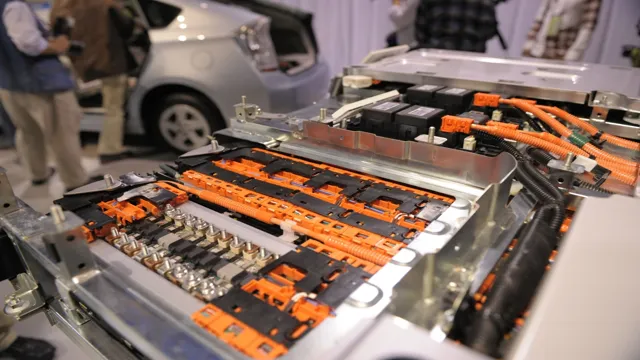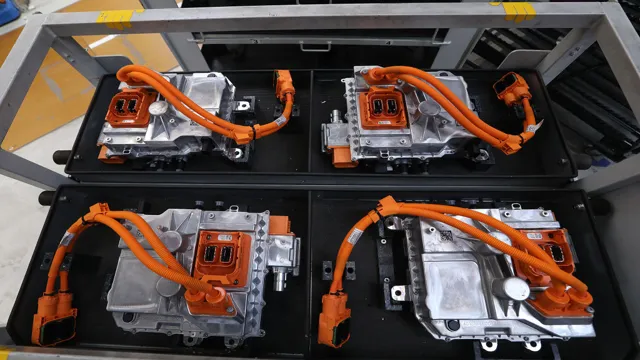Debunking the Myths: The Truth About Electric Car Batteries
Electric cars are becoming increasingly popular as individuals seek a more sustainable transportation option. However, with the rise of electric cars also comes concerns about their batteries. Are they reliable? Will they last long enough? These doubts raise questions about the overall effectiveness of electric cars as a viable solution to environmental issues.
In this blog, we delve into the world of electric car batteries and explore whether they are bad or good. We will examine the science behind these batteries, their strengths and weaknesses, and ultimately answer the question of whether they truly are a revolutionary development in personal transport.
Advantages of Electric Cars
Are electric car batteries bad? Despite the myths that circulate about electric vehicles being potentially dangerous or less efficient than their gasoline-powered counterparts, the truth is that electric car batteries are not bad. In fact, they have numerous advantages over traditional engines. Electric car batteries are rechargeable, which means that they can be used for longer periods of time without requiring frequent stops at the gas station, saving you time and money.
They also emit fewer pollutants and harmful emissions, making them more eco-friendly and sustainable for the environment. Additionally, with advancements in technology, electric car batteries are becoming increasingly efficient, powerful, and longer-lasting. So, if you’re considering purchasing an electric car, don’t let misinformation scare you away – the benefits of these innovative vehicles are undeniable.
Lower Maintenance Costs
Electric cars have several advantages over their gas-guzzling counterparts, and lower maintenance costs is one of them. Electric vehicles require much less maintenance than traditional cars since they have fewer moving parts. Unlike internal combustion engines, electric motors have no oil to change, no belts or hoses to replace, and no spark plugs or exhaust system to maintain.
Additionally, electric cars have regenerative braking systems that can last for decades without needing replacement. This makes electric cars not only environmentally friendly but also cost-effective over the long run. Since you won’t need to shell out money on routine maintenance items, you’ll save money in the long run.
Plus, you won’t have to worry about costly engine overhauls or transmission repairs. So an electric car might have a higher upfront cost, but it can save you money over the long run and give you the peace of mind that comes with having fewer maintenance issues to worry about.

Lower Fuel Costs
Electric cars are becoming increasingly popular, and for good reason. One of the greatest advantages of driving an electric car is the lower cost of fuel. Unlike gas-powered cars, which require constant trips to the gas station and have volatile gas prices, electric cars can be charged at home or at public charging stations.
The cost of electricity is generally much lower than the cost of gasoline, which adds up over time to significant savings for electric car owners. Additionally, electric cars require less maintenance than gas-powered cars, which further reduces costs. While the upfront cost of purchasing an electric car may be higher than a traditional car, the long-term savings on fuel and maintenance make it a smart investment for those looking to save money in the long run.
Overall, switching to an electric car can help individuals save money while also reducing their carbon footprint on the environment.
Reduced Carbon Emissions
Electric cars have numerous advantages, including reduced carbon emissions. These eco-friendly vehicles operate by using electric motors powered by rechargeable batteries instead of internal combustion engines that burn fossil fuels and release harmful pollutants into the air. Because electric vehicles generate no emissions from the tailpipe, they are able to significantly reduce the amount of carbon dioxide and other greenhouse gases that contribute to global warming and climate change.
In fact, some studies suggest that electric cars could reduce carbon emissions by up to 80% over their lifetime compared to gasoline vehicles. By investing in electric cars, individuals and businesses can play an important role in reducing their carbon footprint and protecting the environment for future generations.
Myths about Electric Car Batteries
Are electric car batteries bad? It’s a common misconception that electric car batteries are terrible and have a short lifespan. However, this simply isn’t true. Electric car batteries are designed to be durable and long-lasting, with many lasting for at least 10 years without any significant degradation in performance.
Additionally, the materials used to make these batteries are almost entirely recyclable, making them an eco-friendly alternative to traditional gasoline-powered cars. While it’s true that electric cars are still relatively new to the market and there are some concerns about their longevity, it’s important to remember that this technology is constantly evolving and improving. So if you’re considering switching to an electric car, don’t let myths about battery life hold you back.
Expensive to Replace
Electric car batteries have been the subject of numerous myths and misunderstandings, mainly due to people’s lack of knowledge of the technology. One of the most prevalent myths is that electric car batteries are expensive to replace, which is untrue. The cost of replacing an electric car battery is significantly lower than what people think, and it is not a regular occurrence by any means.
In fact, most electric car batteries come with warranties that last upwards of a decade, which covers any necessary replacements or repairs during that period. Additionally, many electric cars can be driven for years and tens of thousands of miles before needing a new battery. Therefore, the fear that electric car batteries are costly to replace is unfounded and misleading.
It’s high time we debunked these myths so more people can make informed decisions when choosing their next car.
Quickly Lose Charge
Electric car batteries have been around for a few decades now, yet there are still some misconceptions and myths floating around about them. For example, many people believe that electric car batteries quickly lose their charge, leaving drivers stranded. However, this is simply not true.
While it is true that electric car batteries have a limited range, most modern electric cars can travel for at least 200 miles on a full charge, with some models capable of going much further. Additionally, electric car batteries can be recharged quickly and easily at public charging stations or at home using a charging cable. It’s important to dispel these myths about electric car batteries so that more people can understand their potential and consider transitioning to electric vehicles in the near future.
Bad for the Environment
When it comes to electric cars, there are many myths surrounding the environmental impact of their batteries. One common misconception is that the production of electric car batteries requires a lot of energy, which in turn contributes to greenhouse gas emissions. However, this is not entirely true.
While the manufacturing process does require energy, most electric car batteries are designed to last for a long time – up to 10 years or more. This means that over the lifetime of the vehicle, the energy used during the production process is more than offset by the energy savings achieved by driving an electric car. Furthermore, many electric car manufacturers are taking steps to reduce the environmental impact of battery production by using sustainable materials and renewable energy sources in their manufacturing processes.
So while it is important to acknowledge the environmental impact of electric car batteries, it is also important to recognize that these vehicles are still a much greener option compared to traditional fossil fuel-powered cars.
Facts about Electric Car Batteries
Are electric car batteries bad? Quite the opposite actually! Electric car batteries are a significant technological advancement that provides a more environmentally friendly mode of transportation. While some may argue that the batteries will inevitably wear out and need to be replaced, this is a common misconception. In fact, most electric car manufacturers offer a battery warranty up to 8 years and 100,000 miles.
Additionally, electric car batteries are becoming increasingly efficient and long-lasting, with some newer models boasting over 300 miles on a single charge. It’s important to note that like any other battery, electric car batteries will degrade over time, but proper maintenance and care can prolong battery life. In comparison to the environmental impact of traditional gas-powered vehicles, the benefits of electric car batteries far outweigh any potential downsides.
Long Lifespan
Electric Car Batteries Electric car batteries have a longer lifespan than traditional gasoline engines. In fact, studies have shown that electric car batteries can last up to 15-20 years with proper maintenance and charging habits. The batteries are designed to have at least 70% of their original capacity after 100,000 miles of driving.
This means that electric cars can have a long-term impact on the environment as there’s less waste produced from worn-out batteries. The batteries are also highly recyclable as they’re made of materials like lithium-ion, cobalt, and nickel which are valuable and can be easily reused. Plus, with declining battery costs and improvements in technology, it’s becoming more affordable and accessible to own an electric car.
So, you can save money in the long run while also making a difference for the planet.
Highly Safe and Reliable Technology
Electric Car Batteries Electric car batteries are highly safe and reliable technology that powers the transportation of the 21st century. The performance of electric car batteries has improved significantly over the years, with the latest batteries capable of providing a range of over 300 miles on a single charge. Unlike traditional internal combustion engines, electric cars run on rechargeable batteries that produce zero harmful emissions, making them an eco-friendly mode of transportation.
In addition to being environmentally friendly, electric car batteries are also extremely safe. They are designed with multiple layers of protection to prevent overheating and fire hazards, which is why they are considered a safer alternative to gasoline-powered cars. The batteries are also durable and have a longer lifespan than traditional car batteries.
They are made from high-quality materials that can withstand extreme temperatures and harsh weather conditions. With the advancements in electric car battery technology, it is clear that the future of transportation is electric.
Conclusion: Electric Car Batteries are Good for the Environment and Your Wallet.
In conclusion, while it may be tempting to point fingers at electric car batteries as the culprits for various environmental concerns, the reality is often more nuanced. Yes, there are certainly challenges associated with manufacturing and disposing of these batteries, but these issues are not unique to electric vehicles. Additionally, the benefits of driving an electric car – from reduced emissions to lower fuel costs – cannot be ignored.
At the end of the day, the answer to whether electric car batteries are “bad” is not as simple as a yes or no. Like most things in life, it’s complicated. But with continued innovation and advancements in technology, there’s reason to believe that the future of electric cars – and their batteries – is looking brighter all the time.
“
FAQs
Are electric car batteries bad for the environment?
Electric car batteries are not entirely bad for the environment, but their production process and disposal can be harmful. Manufacturing batteries requires significant amounts of energy, which in turn means high emissions of greenhouse gases. On the other hand, electric cars reduce air pollution, which is a significant contributor to climate change.
How long do electric car batteries last?
The lifespan of electric car batteries depends on various factors such as the type of battery, usage, and maintenance. Typically, electric car batteries last about 100,000 miles before they need replacement. However, with proper care, the batteries can last much longer.
Are electric car batteries expensive to replace?
Yes, electric car batteries can be costly to replace, and the cost varies depending on the car model and the battery type. Generally, replacing an electric car battery can cost anywhere from $5,000 to $15,000.
Can electric car batteries be recycled?
Yes, electric car batteries can and should be recycled to reduce waste and environmental harm. The recycling process can recover valuable materials such as lithium, cobalt, and nickel, which can then be used to manufacture other batteries or products. Moreover, recycling also reduces the demand for virgin materials, which can have a significant impact on the environment.





